

 Thursday, January 28, Beebe, Arkansas -
You can tell you're in the United States of America, when something like this happens - when an overzealous Mother Nature wags her heavy tail through our communities, and clonks out homes like figurines on a coffee table - and though we suffer tremendous damage, and though thousands of us are left homeless, we don't bother to apply for disaster aid with other countries.
Thursday, January 28, Beebe, Arkansas -
You can tell you're in the United States of America, when something like this happens - when an overzealous Mother Nature wags her heavy tail through our communities, and clonks out homes like figurines on a coffee table - and though we suffer tremendous damage, and though thousands of us are left homeless, we don't bother to apply for disaster aid with other countries.
It was January 21st, a date many people around here will remember with horror. All day, there had been warnings of severe weather, and though you just can't predict a tornado, the residents here had a feeling. This part of the country is a hotspot for tornados, and it was going to be hot tonight. People made some precautions; they brought inside large objects (which could turn into large, flying objects) like patio furniture and lawn mowers. They stocked up on food and batteries, and whoever had a storm cellar started taking reservations. The feelings were well founded, and tornados hit late in the day, raging across the Arkansas sky like wild horses.
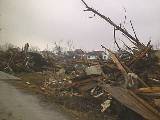 Rick Peson was so close to the twisters that he could hear the howl. "I stood out in my front yard and watched them hit," he says. "I was wondering when they were gonna hit my house." He was one of the lucky ones in Beebe {pronounced "Bee-bee") whose house was unscathed. The town was one of the worst hit outside of Little Rock, and residents even had the uncertain pleasure of a Presidential visit - why, just a week ago, a visit to this little town of 5,000 people, by the President of the United States would have been a major, once-in-a-lifetime event. Today, people are just trying to find their underwear.
Rick Peson was so close to the twisters that he could hear the howl. "I stood out in my front yard and watched them hit," he says. "I was wondering when they were gonna hit my house." He was one of the lucky ones in Beebe {pronounced "Bee-bee") whose house was unscathed. The town was one of the worst hit outside of Little Rock, and residents even had the uncertain pleasure of a Presidential visit - why, just a week ago, a visit to this little town of 5,000 people, by the President of the United States would have been a major, once-in-a-lifetime event. Today, people are just trying to find their underwear.
The storms took seven lives, and afterward, there was an eerie stillness throughout the state and the nation - as America stood in respect for the victims, in fear of Mother Nature and in line to help out. Imagine starting all over from scratch. No, imagine starting all over from scratch, after an event that came without warning and left you standing on a pile of garbage which you called home only hours earlier. What do you do? Where do you start?
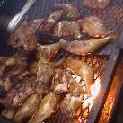 The place where many people around here are starting, is the Beebe Church of Christ, which has been a culinary command center for everyone involved in this mess, everyone from the residents who lost their homes, to the volunteers and professionals. Hundreds of people each day come in here and get a square meal, Outside, Peson, Tommy Kelly and men and women from the Pine Bluff Police Department run cordwood and cutlets through a half dozen donated smokers and large grills.
The place where many people around here are starting, is the Beebe Church of Christ, which has been a culinary command center for everyone involved in this mess, everyone from the residents who lost their homes, to the volunteers and professionals. Hundreds of people each day come in here and get a square meal, Outside, Peson, Tommy Kelly and men and women from the Pine Bluff Police Department run cordwood and cutlets through a half dozen donated smokers and large grills.
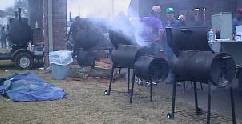 Kelly, who is taking a week off from work at the Pine Bluff Police Department, is more than pleased to be able to help. "I enjoy it," he says. "God blessed me with a job where I can take off and help people, so I'm out here, helping people." He lives about an hour away, but has driven here every day this week to help out.
Kelly, who is taking a week off from work at the Pine Bluff Police Department, is more than pleased to be able to help. "I enjoy it," he says. "God blessed me with a job where I can take off and help people, so I'm out here, helping people." He lives about an hour away, but has driven here every day this week to help out.
One thing Kelly and Peson know, as does most everyone here, is that after a disaster like this, you have to rebuild, and before you can rebuild, you have to clean up, and somewhere in between bulldozing rubble and hanging drywall, you have got to eat. Since that destructive evening last week, these guys have barbecued and smoked over 50 cases of donated chicken, 100 cases of hamburger, and piles and piles of steaks, shrimp, pork chops and "every meat you can imagine, except lamp and chitterlings," says Peson. But this is only a small part of this impressive operation.
 Mary Woody has also been here all this week, helping to run the food and supply distribution operation. Woody and other volunteers have sorted and organized thousands of donated items, and distributed them to anyone who needs help. "We don't really ask questions or qualify people," she says. "They just tell us how many children and adults they have and we give them what they need." A man comes in needing a flashlight, so he leaves with a flashlight. Another person needs a mop bucket, and they find him a mop bucket.
Mary Woody has also been here all this week, helping to run the food and supply distribution operation. Woody and other volunteers have sorted and organized thousands of donated items, and distributed them to anyone who needs help. "We don't really ask questions or qualify people," she says. "They just tell us how many children and adults they have and we give them what they need." A man comes in needing a flashlight, so he leaves with a flashlight. Another person needs a mop bucket, and they find him a mop bucket.
The operation runs pretty smoothly, with supplies sorted and boxed for families of different sizes. Each room of the church has been cleared of its usual furnishings and is now used to store goods. A side door serves as a drive-up for people picking up supplies. Tonia Spradlin, a volunteer from the nearby town of McRae, tells me that, between this distribution center and the kitchen, there are up to four dozen volunteers here at a time, "For something not planned," she says, "this has worked out extremely well."
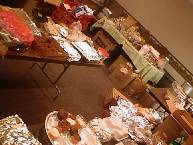 See all the tinfoil? Much of the food on this impromptu buffet line is homemade and was brought in by people who still have a home, and who still have a heart. |
 Steve Rackley, of Pleasant Plains, Arkansas, checks out his storm cellar, where he and 14 neighbors, friends and a few police officers sought refuge from last week's tornados. Such cellars are common here in "Tornado Alley," yet, in the 14 years that Rackley has owned the 6' x 8' shelter, he has only used it once.
Steve Rackley, of Pleasant Plains, Arkansas, checks out his storm cellar, where he and 14 neighbors, friends and a few police officers sought refuge from last week's tornados. Such cellars are common here in "Tornado Alley," yet, in the 14 years that Rackley has owned the 6' x 8' shelter, he has only used it once.
|
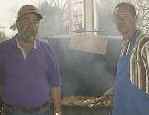 Kelly (on right) is not being paid for his tireless work. Neither is Peson, shown on the left, or Woody, or Spradlin, or any of the thousands of volunteers who came out to help. They weren't even asked to lend a hand. All they did was drive up and say; "what can I do?" In fact, calling them volunteers takes away from their contribution, as in; "oh, she's a volunteer" or "I need some volunteers over here!" When you give them a label, as handy as it is, you detour from the true meaning, and you take a shortcut from saying; "I need somebody who will work their tail off for hours and hours, for days and days, and not get paid a dime for it, when they could be earning money or sitting at home, taking a nap." America is packed full of these people, and they literally support hospitals, libraries, schools and thousands of organizations around this country and around the world. In fact, coming to the aid when aid is needed is such a strong tradition in our great country, that we could very well stop referring to these heroes as volunteers and just call them what they are; Americans.
Kelly (on right) is not being paid for his tireless work. Neither is Peson, shown on the left, or Woody, or Spradlin, or any of the thousands of volunteers who came out to help. They weren't even asked to lend a hand. All they did was drive up and say; "what can I do?" In fact, calling them volunteers takes away from their contribution, as in; "oh, she's a volunteer" or "I need some volunteers over here!" When you give them a label, as handy as it is, you detour from the true meaning, and you take a shortcut from saying; "I need somebody who will work their tail off for hours and hours, for days and days, and not get paid a dime for it, when they could be earning money or sitting at home, taking a nap." America is packed full of these people, and they literally support hospitals, libraries, schools and thousands of organizations around this country and around the world. In fact, coming to the aid when aid is needed is such a strong tradition in our great country, that we could very well stop referring to these heroes as volunteers and just call them what they are; Americans.
Check out the Holy Cow! Archives for other flying objects...
Return to our
MAIN page